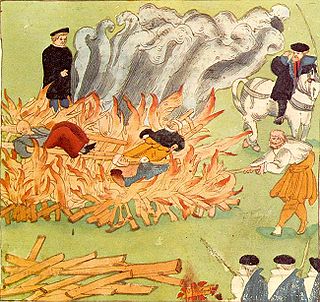Cause may refer to:
Cause may refer to:
A holiday is a day set aside by custom or by law on which normal activities, especially business or work including school, are suspended or reduced. Generally, holidays are intended to allow individuals to celebrate or commemorate an event or tradition of cultural or religious significance. Holidays may be designated by governments, religious institutions, or other groups or organizations. The degree to which normal activities are reduced by a holiday may depend on local laws, customs, the type of job held or personal choices.
Causation may refer to:
Apostasy is the formal disaffiliation from, abandonment of, or renunciation of a religion by a person. It can also be defined within the broader context of embracing an opinion that is contrary to one's previous religious beliefs. One who undertakes apostasy is known as an apostate. Undertaking apostasy is called apostatizing. The term apostasy is used by sociologists to mean the renunciation and criticism of, or opposition to, a person's former religion, in a technical sense, with no pejorative connotation.

A witch-hunt, or a witch purge, is a search for people who have been labeled witches or a search for evidence of witchcraft. The classical period of witch-hunts in Early Modern Europe and Colonial America took place in the Early Modern period or about 1450 to 1750, spanning the upheavals of the Reformation and the Thirty Years' War, resulting in an estimated 35,000 to 50,000 executions. The last executions of people convicted as witches in Europe took place in the 18th century. In other regions, like Africa and Asia, contemporary witch-hunts have been reported from sub-Saharan Africa and Papua New Guinea, and official legislation against witchcraft is still found in Saudi Arabia and Cameroon today.
A belief is an attitude that something is the case, or that some proposition is true. In epistemology, philosophers use the term "belief" to refer to attitudes about the world which can be either true or false. To believe something is to take it to be true; for instance, to believe that snow is white is comparable to accepting the truth of the proposition "snow is white". However, holding a belief does not require active introspection. For example, few carefully consider whether or not the sun will rise tomorrow, simply assuming that it will. Moreover, beliefs need not be occurrent, but can instead be dispositional.
In a civil proceeding or criminal prosecution under the common law or under statute, a defendant may raise a defense in an effort to avert civil liability or criminal conviction. A defense is put forward by a party to defeat a suit or action brought against the party, and may be based on legal grounds or on factual claims.
Representation may refer to:

The Religious Science movement, or Science of Mind, was established in 1927 by Ernest Holmes (1887–1960) and is a spiritual, philosophical and metaphysical religious movement within the New Thought movement. In general, the term "Science of Mind" applies to the teachings, while the term "Religious Science" applies to the organizations. However, adherents often use the terms interchangeably.

Bad faith is a sustained form of deception which consists of entertaining or pretending to entertain one set of feelings while acting as if influenced by another. It is associated with hypocrisy, breach of contract, affectation, and lip service. It may involve intentional deceit of others, or self-deception.
Contagion may refer to:

The sovereign citizen movement is a loose grouping of litigants, activists, tax protesters, financial scheme promoters and conspiracy theorists, who claim to be answerable only to their particular interpretations of the common law and to not be subject to any government statutes or proceedings, unless they consent to them. The movement, which appeared in the early 1970s, is American in origin and exists primarily in the United States, though it has expanded to other countries. Notably, the freeman on the land movement, an offshoot of the sovereign citizen movement with similar doctrines, emerged during the 2000s in Canada before spreading to other Commonwealth countries. However, sovereign citizens as such have also appeared in these countries and others. The sovereign citizen phenomenon is one of the main contemporary sources of pseudolaw: adherents to its ideology notably believe that courts have no actual jurisdiction over people and that the use of certain procedures and loopholes can make one immune from government laws and regulations. They also regard most forms of taxation as illegitimate. Sovereign citizen arguments have no basis in law and have never been successful in court.
The New Thought movement is a spiritual movement that coalesced in the United States in the early 19th century. New Thought was seen by its adherents as succeeding "ancient thought", accumulated wisdom and philosophy from a variety of origins, such as Ancient Greek, Roman, Egyptian, Chinese, Taoist, Vedic, Hindu, and Buddhist cultures and their related belief systems, primarily regarding the interaction between thought, belief, consciousness in the human mind, and the effects of these within and beyond the human mind. Though no direct line of transmission is traceable, many adherents to New Thought in the 19th and 20th centuries claimed to be direct descendants from those systems.
Questioning is a major form of human thought and interpersonal communication. It involves employing a series of questions to explore an issue, an idea or something intriguing. Questioning is the process of forming and wielding that serves to develop answers and insight.
Cheek v. United States, 498 U.S. 192 (1991), was a United States Supreme Court case in which the Court reversed the conviction of John L. Cheek, a tax protester, for willful failure to file tax returns and tax evasion. The Court held that an actual good-faith belief that one is not violating the tax law, based on a misunderstanding caused by the complexity of the tax law, negates willfulness, even if that belief is irrational or unreasonable. The Court also ruled that an actual belief that the tax law is invalid or unconstitutional is not a good faith belief based on a misunderstanding caused by the complexity of the tax law, and is not a defense.
Dualism most commonly refers to:
Nonconformity or nonconformism may refer to:

In philosophy, naturalism is the idea or belief that only natural laws and forces operate in the universe.
In white supremacist circles, a ghost skin is a white supremacist who refrains from openly displaying their racist beliefs for the purpose of blending into wider society and surreptitiously furthering their agenda. The term has been used in particular to refer to the entryism of racist activists in law enforcement. The term "hiding your power levels", originating from the anime Dragon Ball Z, is alternatively used by the alt-right to reflect a similar concept.

Pseudolaw consists of statements, beliefs, or practices that are claimed to be based on accepted law or legal doctrine, but which deviate significantly from most conventional understandings of law and jurisprudence, or which originate from non-existent statutes or legal principles the advocate or adherent incorrectly believes exist. Pseudolaw often purports to base itself on "common law", though it has no relation to contemporary or historical examples of common law.

Crime in Ghana is investigated by the Ghana Police Service.